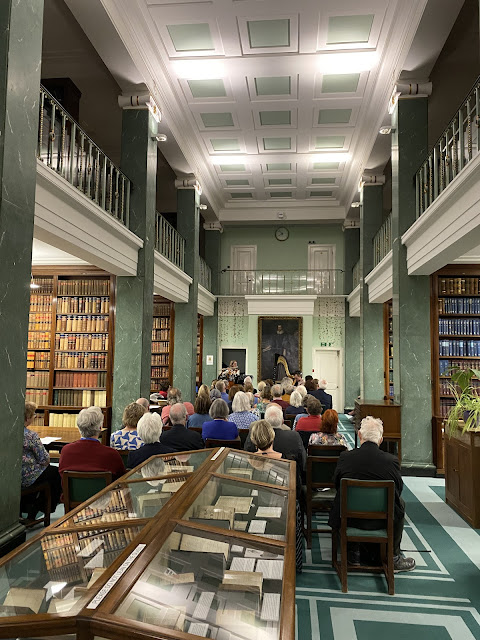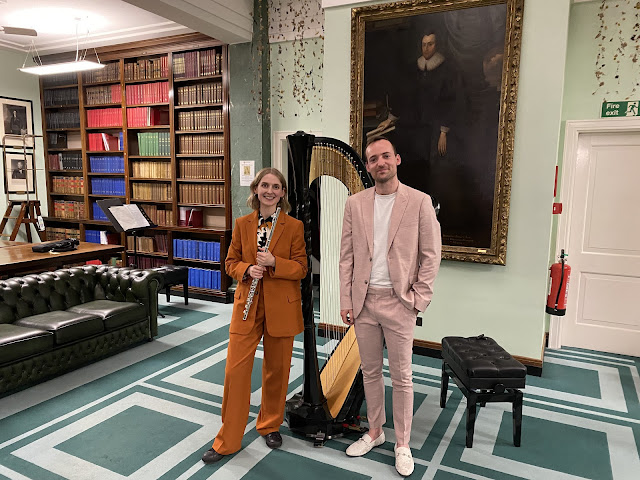 |
| Siren Duo (Claire Wickes, flute, and Tomos Xerri, harp) in Middle Temple Library. |
Debussy, Mozart, David Watkins, Astor Piazzolla, Adina Izarra, Toru Takemitsu, William Alwyn; Siren Duo (Claire Wickes, Tomos Xerri); Temple Music Foundation at Middle Temple Library
Reviewed 17 September 2024
Temple Music’s first concert in the attractive 1950s neo-classical library with a wonderfully imaginative flute and harp programme based around images of fire and water
Temple Music puts regular concerts on in the grand historical spaces of Middle Temple Hall and Temple Church, but on Tuesday 17 September 2024, they presented their first concert in a smaller, more modern space, Middle Temple Library. Siren Duo (Claire Wickes, flute, and Tomos Xerri, harp) gave a chamber recital of music themed on Fire and Water (a theme perhaps not dear to the librarians’ hearts) with music by Debussy, Mozart, David Watkins, Astor Piazzolla, Adina Izarra, Toru Takemitsu and William Alwyn.
The origins of Middle Temple Library are lost in the mists of time, but a new building was created in 1625, to be eventually replaced in the 1860s by a Gothic style building which was badly damaged in the Blitz. The present library was designed by Sir Edward Maufe and opened in 1958. Inside it is striking, mid-Century classical with the main library room having a mezzanine running around it. The acoustic was on the dry side, but highly sympathetic for an intimate chamber recital.
Claire Wickes and Tomos Xerri engagingly introduced the pieces, but we began with Claire Wickes playing Debussy’s Syrinx whilst walking around the mezzanine, unseen but not unheard. Syrinx in the myth was, of course, a water nymph and this linked the piece into the theme. Wickes gave us an evocatively fluid line, beautifully clear and limpid even in the slightly dry acoustic.
This was followed by an arrangement of the second movement of Mozart’s Flute & Harp Concerto, K 299, with the harp playing both the solo line and the orchestra accompaniment. The result was surprisingly effective, with Wickes’ lovely flute line contrasting with the harp’s warmth and delicacy.
Next came a harp solo, Fire Dance by contemporary composer David Watkins. Watkins is a harpist and was principal harp of the London Symphony Orchestra. Fire Dance combined folk-inspired motifs with interesting harmonic colours and plenty of dynamic harp techniques, as well as conjuring images of fire.
Astor Piazzolla’s L’histoire du tango was originally written for flute and guitar, and here was played in a very effective version for flute and harp. The work is one that tends to get transcribed into all sorts of instrumental combinations, so it was lovely to hear it in a version that evoked the original. We heard the first two movements. Bordel 1900 was lively and engaging, with plenty of catchy rhythms and a lovely range of colours in the two instruments. Cafe 1930 began with a distinctly melancholy harp solo, then joined by the elegant, yet wistful line of the flute, though the second half of the movement proved a striking contrast.
Next came a flute showpiece by Venezuelan composer Adina Izarra. El Amolador depicts the street cries of itinerant knife-grinders of the country, including their use of the harmonic flute to advertise themselves. The first half of the work evokes their street cries with Wickes’ flute using strikingly fluid and swift arpeggios to suggest the harmonic flute, yet combining these with a seductively sinuous melody. When we got to the actual grinding, sparks both actual and metaphorical really flew, this was quite a tour de force.
What followed was cooler as the duo played Toru Takemitsu’s Towards the Sea III for alto flute and harp. Takemitsu was inspired by Herman Melville’s Moby Dick, but the three movements were more evocative seascapes than all-action whale hunting. The work was written for Greenpeace, for their Save the Whale campaign. The first movement, The Night was fluid and evocative, contrasting the breathy flute line with flurries of harp writing, highly suggestive of the sea. Moby-Dick was in the same sound world, but with spikier harmonies, and at times the hypnotic flute line seemed to hark back to Debussy’s Syrinx. The range of colours in the alto flute contrasted wonderfully with the harp flurries. Finally, Cape Cod featured intriguing harp harmonies and a liquid flute line, the two undulating suggestively and revealing a range of colours and timbres.
 |
| Siren Duo (Claire Wickes, flute, and Tomos Xerri, harp) in Middle Temple Library. |
Finally we heard, William Alwyn’s duo Naiades, inspired by the composer imagining the water nymphs playing and luring seamen in the river by his studio! A substantial piece, it began atmospherically, leaning into traditional textures for the two instruments, but as things developed the music grew more intense and there were some finely virtuosic passages, alongside the naiades being rather seductive, and we ended with amazing whirling textures.
The blog is free, but I’d be delighted if you were to show your appreciation by buying me a coffee.
Elsewhere on this blog
- An interview with the Snow Maiden: I chat to Ffion Edwards about taking on the title role in Rimsky Korsakov’s opera with English Touring Opera – interview
- A journey of remarkable emotional depth: Laurence Kilsby and Ella O’Neill at Wigmore Hall – concert review
- Engaging charm: Bampton Classical Opera in a delightful version of Alcina that does not take itself too seriously – opera review
- The Game: director Leo Doulton on blending opera with interactive storytelling and video game at this year’s Tête à Tête – interview
- Web of influences: Harry Christophers & The Sixteen’s Choral Pilgrimmage at Old Royal Naval College Chapel, Greenwich – concert review
- L’Olimpiade: Vache Baroque makes an engaging case for Pergolesi’s penultimate opera – opera review
- A subtle depiction of a complex man: Green Opera’s 555, Verlaine en prison at Grimeborn – opera review
- Scaling the peak: David Skinner on recording Byrd’s The Great Service with Alamire reflecting new ideas about pitch and scoring – interview
- Discovering Imogen: A relatively underrated British composer, Imogen Holst is put centre stage in this brand-new recording on NMC – record review
- Exquisite vocal lines & imaginative storytelling: Harry Christophers & The Sixteen focus on Stanford’s secular choral music in Partsongs, Pastorals and Folksongs – record review
- Home








